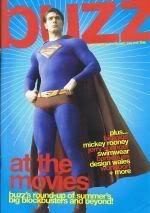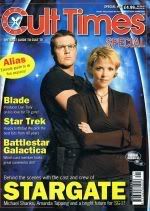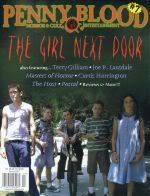Interview with James Eaves
 You might remember that, a while ago, I reviewed a British horror movie called The Witches Hammer. Well, it's being released on DVD in the UK on Monday, and to mark the occasion, here's an interview with director James Eaves for your reading pleasure.
You might remember that, a while ago, I reviewed a British horror movie called The Witches Hammer. Well, it's being released on DVD in the UK on Monday, and to mark the occasion, here's an interview with director James Eaves for your reading pleasure.
So, tell me a bit about The Witches Hammer.
The Witches Hammer is an action/horror film that tells the story of Rebecca, a woman who is changed into a genetically engineered vampire in order to fight and kill other vampires, witches and demons. It's our attempt to make a low budget film that looks and feels as high budget and glossy as possible. I wasn't thinking about the budget when I wrote the script; just what I wanted to see on screen. I think, for the most part, we have achieved what the script set out.
You wrote and directed The Witches Hammer; where did the idea come from, initially?
I'm a big Buffy/Angel/Blade fan and I always wanted to do a vampire movie.
Did you feel it was important to have that much control?
Yes! Having worked in a partnership before, I realised early on the importance of having one vision behind the film. It makes things so much easier; you save so much time that you normally would spend 'negotiating' your ideas and you can be creatively free. I'm very lucky in that I have a good base of people working on the films who wouldn't be afraid to say something if they felt it wasn't working/looked tacky etc. But they also have faith in my ideas.
There are a lot of flashbacks in the movie to different eras, to explain the backstory of various characters; did you feel that was necessary? How much planning went into the backgrounds of each character? (It was quite disappointing that we didn't get more info on Oscar!)
Due to the cost of 35mm film stock the film was shot over a long period of time (three years). That had its disadvantages, but its one major advantage was that it meant we were able to spend time getting the flashbacks just right.
Apologies for no Oscar flashback, I really enjoyed making the flashbacks and would have loved to do an Oscar one, but I was always conscious of how these little episodes away from the main narrative would affect the viewer. I never wanted to put the audience in a position where they were thinking "groan… here he goes again with another story." All the flashbacks were shot on S16mm stock, which meant I had a higher shot ratio so shooting the flashbacks was always less stressful than the main shoot. (A 400ft roll of S16mm stock lasts about 8 minutes and costs around £50, a 400ft roll of 35mm film stock costs over double and lasts only 4 minutes)
I think the flashbacks help the fact we have so many character. They make the film bigger than it is and give a nod to the past events that lead to the main story. Even though we were on an extremely limited budget, I wanted the film to feel like it had a larger scope and I think the flashbacks provide this.
A lot of the flashbacks seemed to be trying to create a mythology unique to the film, but you included (and indeed based the plot around) the Malleus Maleficarum; how much was based on fact and how much did you fictionalise?
Pretty much everything is fiction and not based on the book. I loved the title of the book, and the fact that there was actually a book written that had instructions to kill witches and vampires. I then started to think about where two monks got all their ideas and methods from; so I created the witch, Kitanya, to explain the existence of the book.
The comedy in the film is absolutely brilliant; anything featuring Oscar is great, and the scene with Edward in the kitchen looking for knives is hilarious, too. Why did you go for that approach instead of just making a straight horror movie?
Thanks! I think the comedy moments came from the characters. The scenes with Charlotte and Oscar just leant themselves to comedy so it was easy to put them in situations where you could tease a few laughs out. I think as the film progresses it gets more light-hearted and humorous, especially with the introduction of Charlotte and Oscar.
How did Stephanie Beacham come to be involved?
I was talking to Stephanie about another film and then started writing The Witches Hammer and wrote the part of Madeline for her. I always liked her in The Colby's and wanted to make sure we had a recognizable face in the film, I also loved the fact that she had been in Dracula A.D. 1972…
You filmed on film, rather than video or digital; why was that?
At the time we started shooting The Witches Hammer, digital hadn't made such a large impact and there was an amount of snobbery with the sales agents/distributors in Cannes when it came to digital vs film projects. Back then, digital usually meant that the film had a lot lower production values due to the ease of shooting on tape. With film they were at least guaranteed you had lit the film properly and spent time and budget on the production. Also, I wanted to make the move from 16mm to 35mm. Even though I am shooting the next film on HD, film is still without doubt the superior format. I'm glad we shot on 35mm, as we've all learnt a lot from the discipline involved in shooting on a 1 to 1 shot ratio. Nothing is wasted.
Also, I heard a rumour that the 35mm Panavision cameras we shot The Witches Hammer on were originally used on Tim Burton's Batman, which was awesome as I love that film and would cite it as one of the reasons I wanted to become a director.
There are several impressive-looking locations used in the movie, where did you film those? (Particularly the medieval village and the castle at the end.)
The medieval village is a re-enactment society place in the South, you can walk round and people are dressed in medieval costumes talking in ye olde speak. The location was perfect as the sets were all there, and we shot on the hottest day of the year so lighting was also taken care of. I think it's regarded by most of the crew as the best memory of shooting. The castle is actually a series of vaults beneath Southampton, very dusty and musty but excellent fakes for the inside of a castle. I really have to thank Southampton Council for that, they bent over backwards for us.
You co-wrote and co-directed Hellbreeder with Johannes Roberts; what was that like? Will you be working with him again in future?
Hellbreeder was hell! A really hard film to make for many many reasons; also, Hellbreeder has a bitter taste as it's not the film we originally made. Our intention was to make an art house horror movie about a woman coping with the death of her child but when we'd finished it, no one wanted to distribute the film we made. We were forced to do a re-cut and now have the bastard child that is Hellbreeder on our filmographies! Hopefully Alice, the original version, will be released one day and people can see what we were trying to do.
Your next project, Bane, is going to be a horror movie too, right? Tell me a bit about that.
Bane is very different to The Witches Hammer. The Witches Hammer was all about the spectacle and the set pieces, a fun movie; Bane is a character based horror with elements of classic science fiction. We put a lot of time into casting the movie and as a result we have four very good lead actresses who have put a lot of work into their performances to make them as believable as possible, this is vital as the whole film is set in a very alien environment.
What attracts you to horror over any other genre? Are you a fan of horror? The Witches Hammer is pretty radically different from most of the "torture porn" that's in fashion at the moment.
I like horror films but wouldn't class myself as a huge horror fan, more of a genre fan, I like sci-fi/action/martial arts/horror/musicals etc. On a low budget, horror is what sells. You can make a horror film relatively cheaply and make sure you get the film released. With something like a drama, the audience (and, more importantly, the distributors) expects to see named cast.
What's it like being an indie filmmaker in the UK at the moment?
It's tough. The hardest part is that you can't just be a director,: you have to learn all of these other things: distribution, sales, marketing, etc, so that your film reaches its audience. Things can move slowly and you need a lot of stamina to keep it rolling.
Finally -- why "The Witches Hammer" instead of "The Witch's Hammer" or "The Witches' Hammer"?
I get asked this a lot, so I have three fully prepared reasons for you:
1. It's a direct translation of the title of the book
2. The Hammer is for killing the Witches (It doesn't belong to them) e.g. 'I'll go and get my Badgers Hammer'…
3. (The real reason!) The apostrophe weakens the title… I just think it looks cooler!
I still think he's wrong about that second point -- and, while I'm on the subject, the third reason, too; but we'll just have to agree to disagree.
The Witches Hammer hits shelves on 26th March; click here to go and buy it.










2 comments:
Yes Sarah, I'm afraid to say that, so far, the title has put me off actually watching the movie (sorry James!). Not that I'm shallow or anything, you understand...
On the topic of titles jason, I wouldn't have known about any of James Eaves' films if it wasn't for the title 'Bane', which instantly got me interested in his films. Don't ask why... I just liked the name!
Post a Comment